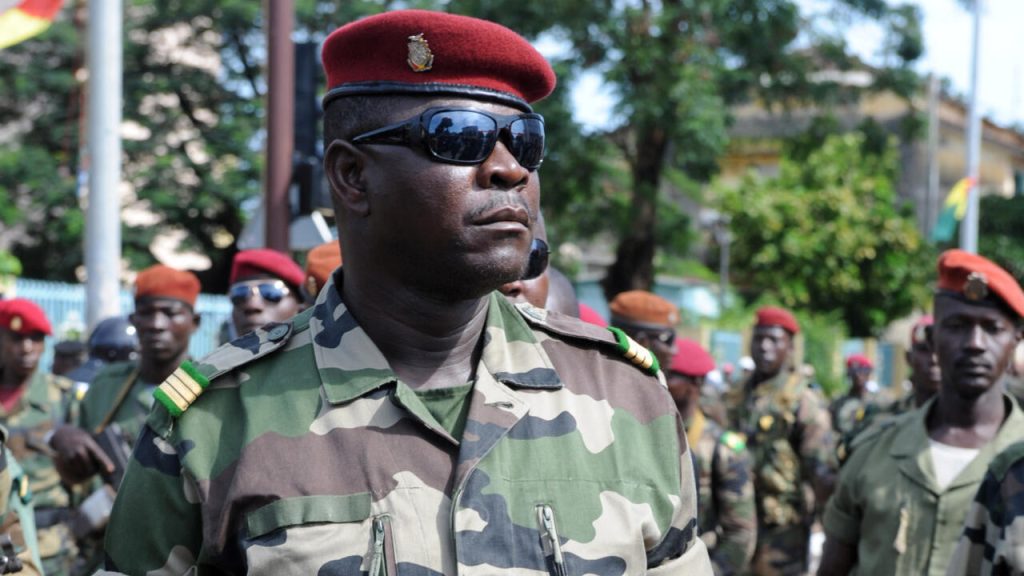Guinea stadium massacre fugitive extradited from Liberia
3 min read

Guinea’s most wanted fugitive, former military officer Claude Pivi, has been extradited from neighboring Liberia, along with his son, following his escape from prison last November. Pivi, who had been sentenced to life in prison in absentia for his involvement in the notorious stadium massacre in Conakry in 2009, is now back in custody.
Pivi and his son, Verny Pivi, were apprehended during a routine security check on the border between the two countries on Tuesday. Images that surfaced online showed a frail Pivi, handcuffed, standing beside his son, who is accused of orchestrating his father’s prison escape.
The charges against Claude Pivi stem from one of the darkest chapters in Guinea’s recent history: the brutal killings of over 156 opposition supporters during a rally on September 28, 2009. The rally, held to demand a return to civilian governance, ended tragically when security forces opened fire on the crowd. At the time of the massacre, Pivi was serving as the minister of presidential security under then-leader Moussa Dadis Camara, who has also faced legal repercussions for his role in the events.
The Guinean authorities had put a bounty of $58,000 (approximately £43,700) on Pivi’s head in hopes of securing his capture. Following his extradition, he was returned to Conakry’s main prison, where he is expected to serve his life sentence. Military prosecutor Colonel Aly Camara confirmed Pivi’s return, stating, “He was brought back to the central prison to serve his sentence in accordance with the law.”
Pivi’s lawyer, Abdourahmane Dabo, acknowledged his client’s return but expressed grave concerns about his health, describing him as “weak.” The nature of Pivi’s health issues has not been disclosed, but his condition adds a layer of complexity to his already controversial situation.
The news of Pivi’s extradition has sparked a range of reactions in Guinea. Fatoumata Diariou Camara, a survivor of the 2009 violence, expressed her relief upon hearing of Pivi’s recapture. “I am overjoyed that he has been recaptured. I pray that he will remain in prison forever,” she told AFP. Her sentiments echo the feelings of many who suffered during that tragic event, as calls for justice and accountability continue to resonate across the nation.
The fallout from the 2009 massacre has had lasting effects on Guinea’s political landscape, with many citizens demanding justice for the victims and accountability for those responsible. The return of Claude Pivi to prison represents a step towards addressing these grievances, although it remains to be seen how the legal processes will unfold moving forward.
Pivi’s extradition is particularly significant as it follows a series of high-profile legal challenges faced by former military leaders in Guinea. Moussa Dadis Camara, the leader at the time of the massacre, had also escaped but was quickly recaptured and is currently serving a 20-year sentence for crimes against humanity. His continued imprisonment reflects the broader efforts within Guinea to hold accountable those responsible for severe human rights violations.
While the legal implications of Pivi’s return to prison will play out in the courts, it is clear that his extradition serves as a reminder of the ongoing struggles within Guinea to confront its past and seek justice for the victims of political violence. The international community continues to monitor the situation closely, advocating for transparency and fairness in the legal proceedings against former officials implicated in the massacre.
As Guinea grapples with its historical injustices, the recapture of Claude Pivi and his subsequent extradition mark a pivotal moment in the nation’s quest for accountability, healing, and ultimately, reconciliation. The hopes of many now rest on the judicial process to deliver justice for the victims and their families, allowing the country to move forward from its turbulent past.